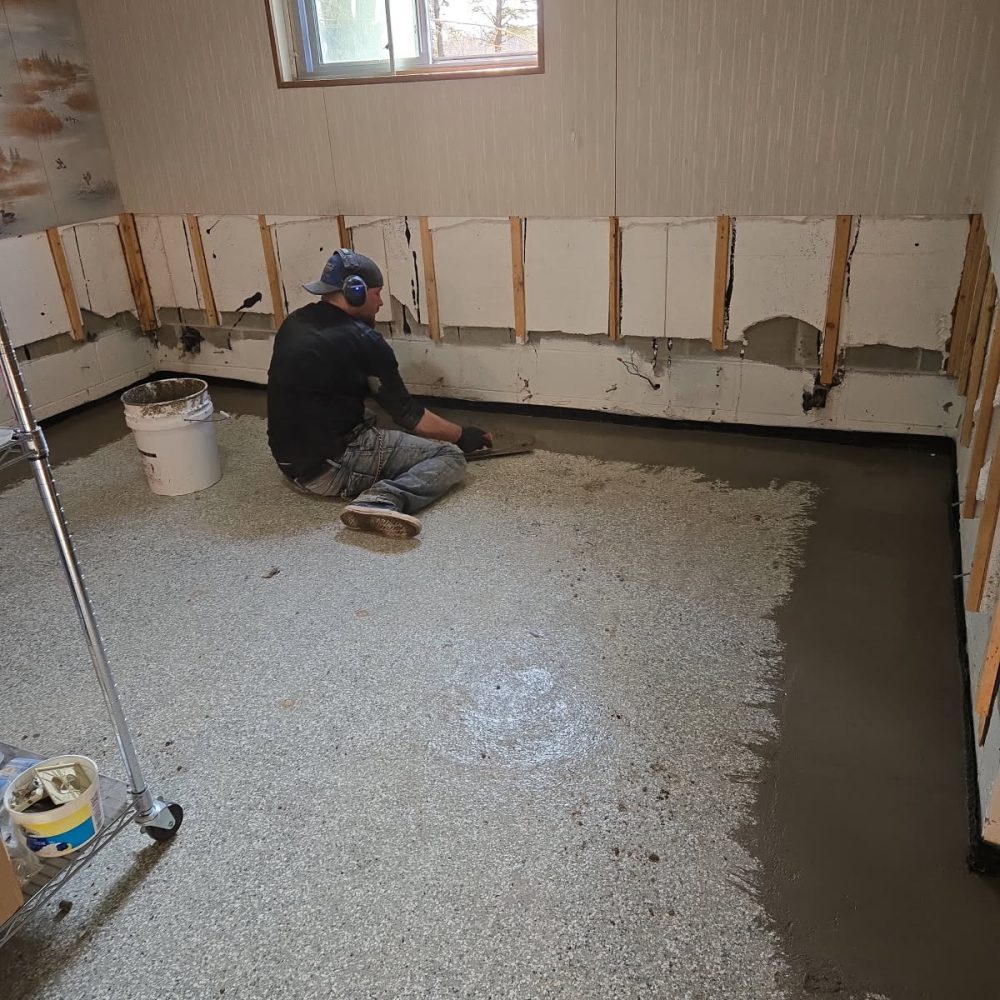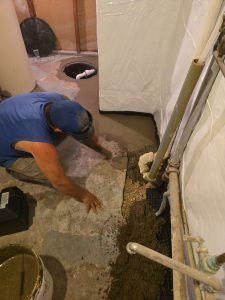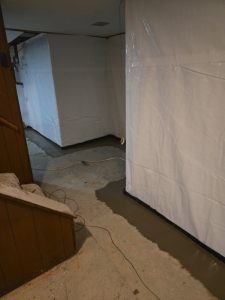
Imagine your house sinking into the ground, all because you didn’t waterproof your basement. Over time, water seeping into unprotected basements can cause foundations to crumble, turning your home into a health hazard with mold and mildew running amok. Not to mention, it can become a money pit, with constant repairs, high energy costs, and a significant drop in property value. Now, wouldn’t you want to know how to prevent this nightmare from ever becoming your reality?
Key Takeaways
- Not waterproofing your basement can lead to water damage, compromising the structural integrity of your home.
- It can foster mold growth, resulting in musty odors and potential health risks such as allergies and respiratory issues.
- Increased humidity levels in unwaterproofed basements can lead to discomfort and chronic health conditions.
- Neglecting waterproofing can escalate your energy costs, as damp basements increase HVAC workload and require additional dehumidification.
- Ignoring the need for waterproofing can lower your property value due to visible damage, infestations, and potential denied insurance claims.
 The Risk of Structural Damage
The Risk of Structural Damage
A staggering 98% of all homes with basements will experience some form of water damage. This devastating statistic underscores the necessity of basement waterproofing, a crucial preventive measure to protect your home’s structural integrity.
When water seeps into your basement, it doesn’t just create a dank, unpleasant environment. It poses a serious risk to the very foundation of your home. Over time, persistent moisture can compromise the concrete, leading to cracks, erosion, and eventual structural instability.
This isn’t a problem you can ignore or wish away. It’s a ticking time bomb that can cause your home’s value to plummet and potentially make your living space unsafe.
Dealing with this issue isn’t just about installing a sump pump or slapping on a coat of waterproof paint. You need to understand the source of the water intrusion and address it at the root. This could involve regrading your landscape, repairing gutters, or installing a drainage system.
Increased Energy Costs
You may not realize, but a poorly waterproofed basement can lead to increased energy costs.
When your basement isn’t properly sealed, your HVAC system has to work harder to maintain a comfortable temperature, leading to inefficiency.
Not only does this ramp up your utility bills, it could also shorten the lifespan of your heating and cooling systems.
Rising Utility Bills
Surging utility bills can often be an unexpected consequence of a poorly waterproofed basement. You may not connect the two at first, but it’s crucial to pay attention to this issue.
When your basement isn’t properly waterproofed, it can become damp and cold, particularly during the rainy season or in colder climates. This dampness and chill don’t stay confined to your basement; they seep into the rest of your house.
When your home’s temperature drops due to this, you’re likely to crank up the heat to compensate. The result? Your heating system works harder, consuming more energy than it typically would, and causing your utility bills to skyrocket.
Moreover, excess moisture can result in the growth of mold and mildew. To combat this, you might find yourself running dehumidifiers more often, another energy-consuming appliance that adds to your bills.
Ignoring a waterproofing issue in your basement won’t just lead to structural damage, but it’ll also put a dent in your wallet. It’s imperative to address this as soon as you notice any signs of moisture, to prevent these additional, unnecessary costs.
Inefficient HVAC Systems
While rising utility bills could be a sign of a poorly waterproofed basement, they can also indicate inefficiencies in your HVAC system. This system, responsible for heating, ventilation, and air conditioning your home, can be severely impacted by excess moisture.
Dampness can compromise the system’s efficiency, forcing it to work harder to maintain a comfortable temperature. This extra work translates into higher energy consumption and, subsequently, increased costs on your utility bills.
If your basement isn’t properly waterproofed, moisture can seep into your HVAC system, leading to potential damage. The presence of water can cause critical components to corrode over time.
This not only shortens your system’s lifespan but also results in decreased performance. A poorly performing HVAC system takes longer to heat or cool your home, causing your energy costs to skyrocket.
To avoid these unnecessary expenses, it’s vital to waterproof your basement correctly. This will guarantee your HVAC system runs efficiently, keeping your home comfortable and your energy bills manageable.
Growth of Mold and Mildew
In the damp, hidden corners of your basement, the growth of mold and mildew can often go unnoticed.
But don’t let its stealthy nature fool you. This seemingly benign issue can swiftly evolve into a nightmare if you don’t waterproof your basement.
Mold and mildew thrive in damp, dark environments. Your basement, sans waterproofing, is the perfect breeding ground.
Over time, they’ll proliferate, causing musty smells and unsightly patches on your walls and floors.
But it’s not just about aesthetics. These fungi pose serious health risks, too. Breathing in mold spores can trigger allergic reactions, respiratory problems, and, in severe cases, neurological damage.
To combat this, you need to control moisture levels in your basement, and waterproofing is a step in the right direction.
It’ll seal off entry points for moisture, depriving mold of the environment it needs to grow.
Without it, you’re fundamentally rolling out the red carpet for these unwanted guests.
Don’t underestimate the problems caused by mold and mildew.
Waterproof your basement to create a healthier, cleaner living space.
Lower Home Value
Beyond the immediate health concerns of mold and mildew, there’s another compelling reason to waterproof your basement: the potential impact on your home value. A damp, leaky basement isn’t just an eyesore—it’s a red flag to prospective buyers, potentially lowering your home’s market value.
Any real estate agent will tell you, a well-maintained home fetches a higher price. A waterproofed basement is part of that equation. If your basement isn’t waterproofed, you’re fundamentally showcasing a problem area, a potential money pit that can discourage buyers, drop bids, or even derail sales.
Here are three ways a non-waterproofed basement might affect your home’s value:
- Buyer Perception: A damp basement suggests neglect and can make buyers question the overall maintenance of the house.
- Remediation Costs: Buyers may factor in the cost of waterproofing the basement, effectively reducing their offer price.
- Inspection Issues: Home inspectors may flag moisture problems, leading to renegotiation or even a cancelled sale.
You’ve worked hard for your home. Don’t let a non-waterproofed basement undermine your investment. Waterproofing isn’t just about today—it’s about preserving your home’s value for tomorrow.
Potential Health Hazards
Ever considered the health hazards lurking in a damp basement? If you haven’t waterproofed this space, you’re putting your health and the health of your family at risk. The dampness can lead to the growth of mold and mildew, which can then become airborne and potentially trigger allergies, asthma, or other respiratory issues.
The primary culprit is black mold, a toxic type of mold that thrives in damp, dark environments. Prolonged exposure to black mold spores can lead to serious health problems, including chronic coughing, headaches, fatigue, eye irritation, and in severe cases, damage to internal organs and the nervous system.
Moreover, damp basements can also emit musty odors, which not only make your living environment unpleasant but can also cause nausea, headaches, and allergic reactions.
In addition, a damp basement can trigger the buildup of harmful bacteria and viruses. These thrive in moist conditions and can easily spread throughout your home, posing a risk of various infections.
Unwanted Pest Infestations
A damp basement becomes a welcome mat for unwanted pests. This is because many pests such as cockroaches, silverfish, and termites thrive in damp, dark conditions. When you don’t waterproof your basement, you’re basically inviting these critters into your home. Let’s explore this further.
- Cockroaches: They love damp environments and are potential carriers of diseases. They can trigger allergies and worsen asthma symptoms, particularly in children.
- Silverfish: These pests are attracted to damp, humid areas. They’re not directly harmful but can be a nuisance as they damage books, wallpapers, and clothes.
- Termites: They’re drawn to moisture and can cause significant damage to your home’s structure.
These pests are more than just an inconvenience. They can lead to severe damage to your property and potential health risks.
Waterproofing your basement helps create an environment that’s inhospitable to these pests, discouraging their settlement. By investing in basement waterproofing, you’re not just protecting your home from water damage, but also from the potential risks and expenses that come with pest infestations.
Don’t wait until it’s too late, take action now.
Frequently Asked Questions
What Types of Waterproofing Methods Are Available for Basements?
You’ve got several options for basement waterproofing. These include interior sealants, interior water drainage, exterior drainage, and exterior waterproofing coatings. It’s important to choose the one that’s best for your home’s specific situation.
How Often Should I Get My Basement Waterproofed?
You should waterproof your basement every 3 to 5 years. Yet, this depends on your home’s condition and local climate. Notice any signs of dampness, mold, or cracks? Don’t wait, get it waterproofed immediately.
What Is the Average Cost for Basement Waterproofing?
Like investing in a sturdy umbrella, waterproofing your basement isn’t cheap but worth it. On average, you’re looking at around $3,000 to $5,000. However, costs can vary based on the size and condition of your basement.
Can I Waterproof My Basement by Myself, or Do I Need Professional Help?
Yes, you can waterproof your basement yourself, but it’s not recommended. Without professional help, you risk missing vital areas, potentially leading to damage. Professionals have the experience and tools to guarantee a thorough, effective job.
Will My Homeowner’s Insurance Cover the Damages if I Don’t Waterproof My Basement?
If you don’t waterproof your basement and damage occurs, your homeowner’s insurance may not cover it. It’s important to check your policy’s details since many don’t cover water damage due to lack of maintenance.
So, are you willing to gamble your home’s structural integrity, pay higher energy bills, and risk your health by not waterproofing your basement? Remember, neglect could lead to mold growth, lower property value, and unwanted pests. It’s clear that the potential risks and costs far outweigh the initial investment in basement waterproofing. It’s not just about protecting your home, it’s about safeguarding your health and financial well-being. Make the smart choice.

All-Star Basements is Locally Owned and Operated and based out of Rochester, Minnesota. We cover Southern Minnesota including the Twin Cities area, Western Wisconsin and parts of Northeast Iowa. Our team is committed to solving our customers’ basement waterproofing, foundation repair, or crawl space needs and offering multiple solutions to choose from.
As a proud member of the Basement Health Association and the National Waterproof Members of America, we have the best products available to solve your leaky basement, seepage, or flooding issues. Our lineup also includes multiple crawl space solutions.
If you have foundation problems that need any kind of repair, we can help! We feature the nationally renowned Grip-Tite Foundation Systems, which has a long history over 90 years of fixing homeowners’ foundation repair issues- from walls that are buckled, tipping or cracked and bowing.
At All-Star Basements, we are committed to providing multiple solutions to choose from to help fix any basement problem you may have. We are very proud of our Better Business Bureau A+ rating and take great pride in caring for all of our customers’ needs- big or small, we do it all!